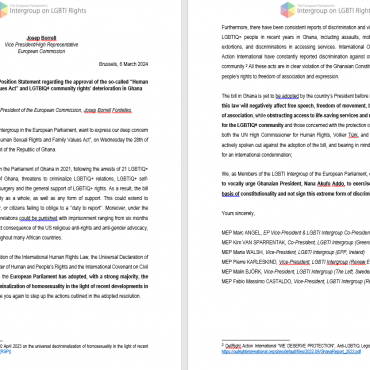Intergroup Bureau writes to Commissioners Kyriakides (Health) and Breton (Internal Market) concerning the need for a European response to monkeypox

Stella Kyriakides, Commissioner for Health
Thierry Breton, Commissioner for Internal Market
Brussels, 15 July 2022
Subject: The need for a European response to monkeypox
Dear Commissioner for Health, Stella Kyriakides,
Dear Commissioner for Internal Market, Thierry Breton,
Cases of monkeypox have been rising in Europe over the last month, exponentially in some instances. Monkeypox particularly affects gay men, bisexual men and other men who have sex with men (MSM).[1] It is however important to note that the risk of monkeypox is not limited to MSM. The WHO has clarified that anyone who has close contact with someone who is infectious is at risk – this is therefore a public health issue that needs a wide-reaching public response.
Recent news on the spread of monkeypox have seized media attention after the COVID-19 pandemic – for a while. Nevertheless, after news reporting zoomed in on those most at risk (MSM), monkeypox seems to have lost notoriety. The seriousness and graveness of the situation is now downplayed because it is perceived as a ‘gay disease’. As political actors, we should be weary of echoing voices from past decades which led to inexistent political action with the first years of the HIV epidemic.
WHO notes that “the outbreak continues to primarily affect MSM who have reported recent sex with one or multiple male partners, suggesting no signal of sustained transmission beyond these networks for now”.[2] Should no action be taken, the situation is likely to change. The WHO also noted that “transgender people and gender-diverse people may also be more vulnerable in the context of the current outbreak.”
There is reason to be concerned, as official WHO numbers put the number of cases in the European region at 4920 on 6 July 2022 (over a week ago), compared to 6027 cases registered globally (European region registers over 80% of all cases globally). 24 EU Member States have registered infections, totaling 3494 cases (over 70% of the total infections in the European region).[3] Despite the fact that only 3 deaths were registered globally by 6 July 2022, this calls for immediate action on preparedness and response.
It is imperative that the Health Emergency and Preparedness Agency (HERA), alongside the European Centre for Disease Prevention and Control (ECDC) and the European Medicines Agency (EMA) coordinate in order to use the lessons drawn from COVID-19 and provide a European response to this matter.
Having this in mind:
- Contact Tracing – An important lesson drawn from COVID-19 was the necessity of contact tracing. Is HERA checking Member States’ are ensuring it?
- Availability of diagnostic capabilities – It is crucial to ensure that citizens have access to diagnostic capabilities in sufficient quantity and that testing centers are at least available in the biggest metropolitan cities. Is HERA coordinating with Member States to ensure this is done appropriately?
- Availability of information/cooperation with ECDC – Monitoring national and regional trends will be important in order to coordinate a European response, and the sharing of information with the ECDC will be of utmost importance. Are Member States appropriately providing information in due time to the ECDC?
- Availability of treatment/Vaccination campaigns – Ensuring availability of treatment must be a priority both for Member States and for the Commission. How is the Commission, with the support of the EMA, ensuring that all Member States have vaccines, antiviral drugs and other protective equipment for health professionals? What actions is it considering to ensure a coordinated approach to vaccination campaigns, both in terms of roll-out, but also of procedures and eligibility of vaccines?
- Public Procurement – We are aware that the Commission initiated a public procurement mechanism for the purchase of vaccines. According to the info we have, HERA procured 100.000 doses and deliveries have begun. Yet, so far only Portugal, Spain, Germany and Belgium received any. We are also aware that remaining doses will arrive only in mid-August, which is unfortunately much too late. What other avenues is the Commission pursuing to ensure a larger amount of vaccines are 1) effectively procured jointly and 2) delivered to Member States in due time, so as to ensure vaccination campaigns can be diligently implemented?
- Availability of information – The information that exists on monkeypox is at present too scarce. An EU wide information campaign is needed to sensitize the general public to both preventive and reactive measures concerning monkeypox. What is the Commission’s view on this matter, and is it coordinating a more general campaign of information to impart fact-based information?
We look forward to hearing from you with the briefest of delays concerning this matter of the utmost urgency.
Yours sincerely,
Marc ANGEL, Co-Chair, LGBTI Intergroup (S&D, Luxembourg)
Terry REINTKE, Co-Chair, LGBTI Intergroup (Greens-EFA Vice-President, Germany)
Fabio Massimo CASTALDO, Vice-President, LGBTI Intergroup (Non-attached, Italy)
Pierre KARLESKIND, Vice-President, LGBTI Intergroup (Renew Europe, France)
Malin BJÖRK, Vice-President, LGBTI Intergroup (The Left, Sweden)
Maria WALSH, Vice-President, LGBTI Intergroup (EPP, Ireland)
[1] WHO (25 May 2022), “Monkeypox: public health advice for gay, bisexual and other men who have sex with men”, accessible at https://www.who.int/news/item/25-05-2022-monkeypox–public-health-advice-for-gay–bisexual-and-other-men-who-have-sex-with-men.
[2] WHO (6 July 2022), “Multi-country outbreak of monkeypox”, accessible at https://cdn.who.int/media/docs/default-source/2021-dha-docs/20220706_monkeypox_external_sitrep_final.pdf?sfvrsn=1b580b3d_4&download=true.
[3] ibid.





